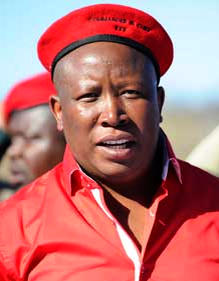
Julius Malema has been accused of corruption and fraud, but now I hear that his trial will not be finalised before the elections next year. How do the pending criminal charges affect his political career or his ability to stand for office?
Poll Watcher
Dear Poll Watcher
Julius Malema is facing serious charges of fraud, corruption, money laundering and racketeering. He is alleged to have benefited from a R52-million contract awarded by the Limpopo department of transport on fraudulent grounds.
At the same time, he is the leader of a political party that will contest the 2014 national elections, the Economic Freedom Fighters (EFF).
If the EFF performs well enough in the elections, it will be entitled to appoint members of parliament from among its members. South Africa has a system of proportional representation and there are 400 seats in the National Assembly. So for every quarter of a percent of the national vote a party gets, it gets one seat in the National Assembly.
The criminal trial has been postponed until September. Mr Malema could conceivably be a member of parliament before his criminal trial is finalised.
Although there are no legal limitations on accused or convicted persons being involved in politics, there are constitutional requirements for eligibility to be a member of parliament. Any person who has been convicted of an offence and sentenced to more than 12 months' imprisonment without the option of a fine is disqualified from membership of the National Assembly. So if Mr Malema is convicted and sentenced to more than 12 months' imprisonment, he would be disqualified from serving as a member of parliament for the EFF.
The practical reality is that the criminal charges will not in themselves preclude him from having a successful career as a politician.
His criminal trial has been postponed, and this will not be the last postponement in the matter.
It will most likely be a long time before his criminal trial is finalised. And even if there is a conviction, the appeals process can take several years to run its course.
Ever since President Jacob Zuma's "Stalingrad" strategy of avoiding prosecution, South African politicians have been able to turn pending criminal charges to their political advantage. A politician facing criminal charges inevitably paints himself as a victim, either of the criminal justice system or his political opponents, or both. Far from being the kiss of death for a politician, a pending trial can become a means for drumming up support and mobilising against unnamed enemies.
For example, the members of parliament who were convicted of defrauding parliament in the Travelgate scandal have not lost their seats. If we wish to stamp out corruption, we have to fight against the gradual normalisation and acceptability of this kind of criminal conduct and attempt to hold our public servants to higher standard.
• This article was first published in Sunday Times: Business Times

